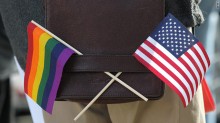 Lesbian.com, June 11, 2012
Lesbian.com, June 11, 2012
A CNN Poll released Wednesday reflects the swiftly changing views of Americans toward the lesbian, gay, bisexual and transgender (LGBT) community. The poll also reveals a link between having a close friend or relative who is gay and expressing support for LGBT rights.
In the poll 60 percent of respondents replied affirmatively to the question, “Do you happen to have a family member or close friend who is gay or lesbian?” This represents an 11 percent increase in “yes” responses since November 2010 and a 19 percent increase since the question was posed in an October 1998 poll.
Meanwhile, positive responses to the question, “Do you think marriages between gay and lesbian couples should or should not be recognized by the law as valid, with the same rights as traditional marriages?” increased by 10 percent over results of a poll conducted in April 2009. The majority of Americans, or 54 percent, now believe that LGBT unions should be legally recognized as valid.
“The poll confirms what we have known for some time,” said Suzanne Goldberg, a professor at Columbia Law School who specializes in sexuality and gender law. “American attitudes about gay and lesbian people and about marriage equality for same sex couples have been changing consistently and quickly and the arc bends towards equality.”
Academics and advocates have long said that people coming out of the closet can change the attitudes of friends and family, and this poll suggests there might be a strong link between more lesbians and gays coming out and rapidly shifting attitudes towards same-sex marriage.
Goldberg confirmed, “Gay people coming out has prompted an enormous change.”
W.Va. teen loses broadcast after claiming President Obama is “making kids gay”
The Caiden Cowger internet radio show is officially off the air. Just two weeks after the 14-year-old asserted that being homosexual was a “perverted belief” and that President Obama was “making kids gay” by expressing support for gay marriage, Spreaker, a free audio program that hosts radio shows, has pulled the plug on the misinformed teen.
In Cowger’s May 26 broadcast which went viral earlier this week, the teen shared that he was previously friends with some kids who later came out of the closet. “They were not homosexuals [then]…they just decided all of a sudden, ‘I think I’m going to be gay,'” He concluded, “I’m going to tell you this, guys: President Obama…Vice President Biden…is making kids gay!”
“They are encouraging kids to think, ’Well, you know what? They’re talking about being a homosexual and they’re saying there’s nothing wrong with being gay, so you know what, I think I might try that out for a little bit,” Cowger said. “That is what’s going on!”
Spreaker is the second internet media outlet to rebuke the teen with YouTube having deleted the video “Obama is making kids gay” hate speech and deleting it from the site earlier in the week.
Bisexuals more likely to engage in risky behaviors than straights or gays
Identifying as bisexual or questioning appears to be a risky business. The University of Missouri has published a study which indicates that those who identify exclusively as neither straight nor gay have a greater propensity to engage in risky behavior, especially in regard to alcohol consumption.
University of Missiouri assistant professor of psychological sciences Amelia Talley noted that students who were either bisexual or sexually in flux tended to report the heaviest drinking and the most negative consequences from alcohol use. She noted that, “Those groups reported drinking to relieve anxiety and depression at higher rates than strictly heterosexual or homosexual individuals. One possible explanation is that people who aren’t either completely heterosexual or homosexual may feel stigmatized by both groups.”
The study, published in the Journal of Studies on Alcohol and Drugs, followed approximately 2,000 college students over a four-year period. The students were surveyed twice a year about their sexual self-identification, attraction and sexual behaviors along with alcohol use.






